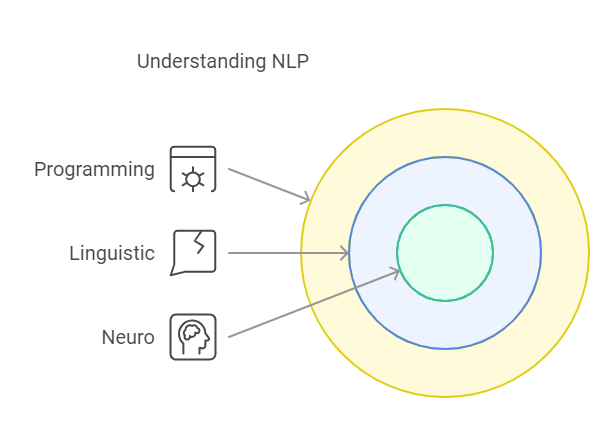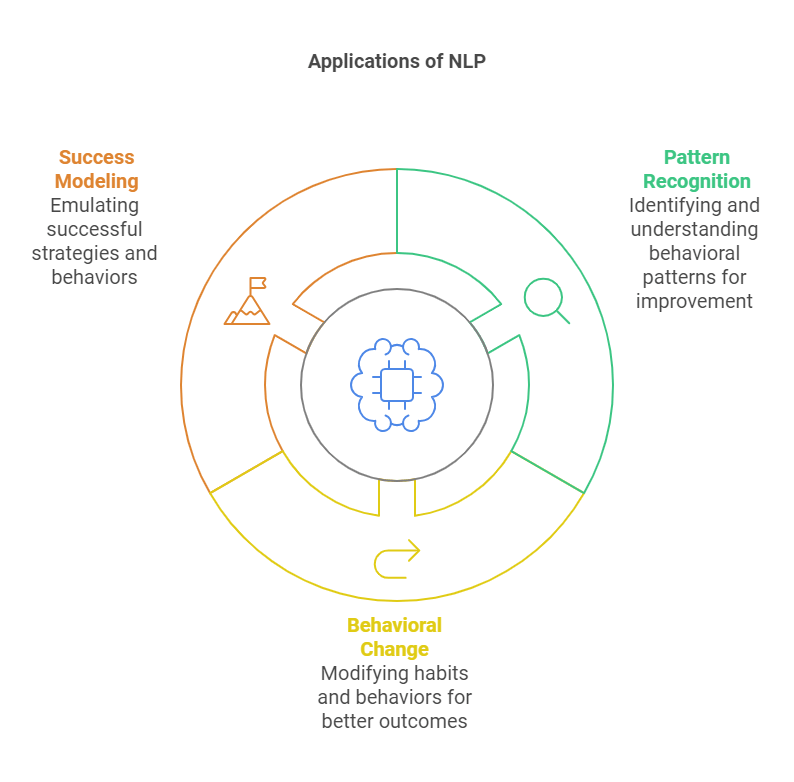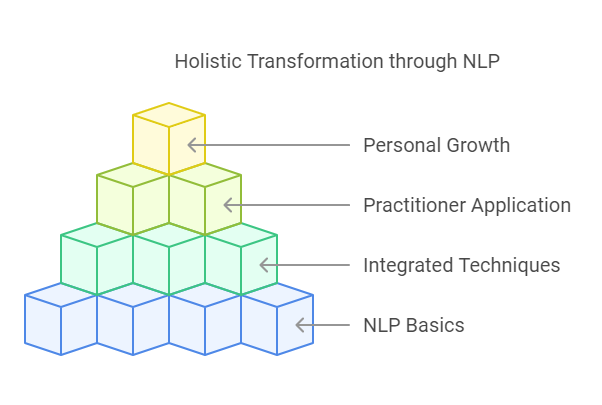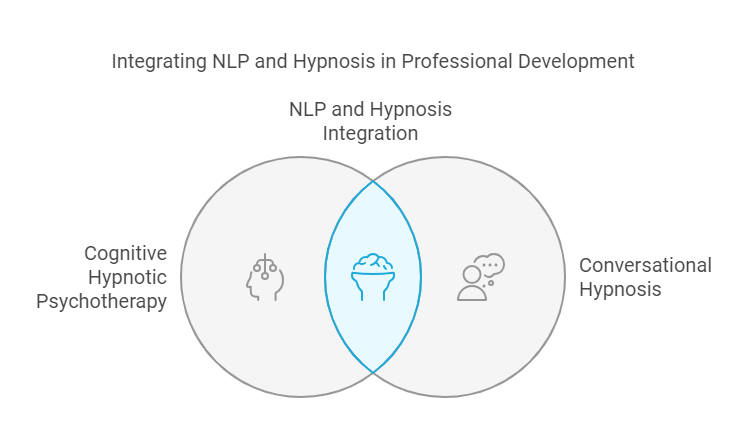Host: Welcome, listeners, to today’s insightful podcast episode where we delve into the fascinating realm of Neuro-Linguistic Programming, often referred to as NLP. If you’ve ever wondered how language, behaviour, and the mind intertwine to shape our lives, you’re in for a treat. I’m joined by Mamta Sharma, an accomplished Advanced Life Coach, Cognitive Hypnotic Psychotherapist, and NLP Master Practitioner. Mamta, thank you for being here.
Mamta: Thank you for having me. I’m thrilled to unravel the mysteries of NLP and how it can truly transform lives.
Host: Excellent! So, let’s start with the basics.
How would you define Neuro-Linguistic Programming in simple words?

Mamta: Absolutely. At its core, Neuro-Linguistic Programming, or NLP, is like a user manual for our minds. It’s the art and science of understanding how our thoughts, language, and behaviours work together to create our experiences. It’s about gaining insights into patterns, both empowering and disempowering, and using this knowledge to achieve excellence in various aspects of life.*
Host: That’s a wonderful analogy, Mamta.
Could you break down the three components of NLP: Neuro, Linguistic, and Programming, and explain how they interplay?

Mamta: Certainly.
Let me make it simpler for you. N in NLP stands for Neuro, which means our Nervous system or the neurological processes which create our experience of the world with the help of our five senses.
L in NLP stands for linguistics or language. Language here doesn’t mean English, Hindi, French or German, but any language we use to communicate with others or ourselves. For example, body language, tone, images and even silence. So let’s say, in order to remember GOD, I see God’s image in my mind. This image is also an example of a language. Not just this, but we also use language to assign meaning to our experiences.
P in NLP refers to Programming, which is the resultant behaviour of the connection between language and neurons. Putting it simply, programming refers to the empowering and disempowering habits, behaviour patterns and strategies that we generally follow instinctively and unconsciously.
Putting the three together, NLP helps you uncover patterns you follow and those others follow. Uncovering these patterns can help you to change the ones that are problematic and replicate the ones that are patterns of excellence, which have helped you or others achieve success in the past. As you start studying and uncovering the patterns followed by geniuses or successful people, you begin to understand how they do what they do that makes them a genius or a success. Once you know how they do what they do, well… you can start modelling them, i.e. start doing the same to get the results they are getting.
Neuro Linguistic Programming describes the fundamental dynamics between the mind (Neuro) and language (Linguistic) and how their interplay affects our body and behaviour (Programming).
In other words, NLP can be used by people from any walk of life at any age to identify and apply patterns of excellence to achieve success.
Host: I love how you simplify the complex, Mamta.
Can you give us an example that illustrates the practical impact of NLP?
Mamta: Absolutely. To make it even more easier to understand this, imagine you’re in a foreign restaurant, and you order what you think is soup, but a salad arrives. Often, we have a similar disconnect with our own minds. We may want success, but our mind speaks a different language, leading to undesired outcomes. NLP is like learning to speak your mind’s language fluently, so you can communicate your desires effectively and get the results you truly want.
Host: That’s interesting, Mamta. Can you share one more example.
Mamta: Certainly. Imagine you have a fear of public speaking. Your “Neuro” responds with anxiety whenever you even think about speaking in front of an audience. “Linguistic” comes into play as your inner dialogue reinforces these anxious thoughts. With NLP, you’d identify the root cause of this fear, reframe your self-talk to be more empowering, and create new mental associations with public speaking. Over time, you’d notice your anxiety diminishing, replaced by confidence and ease when addressing a crowd.
NLP: That example truly brings NLP to life! Could you also highlight how NLP can impact personal growth and relationships?
Mamta: Absolutely. NLP is a treasure trove of tools for self-improvement. By understanding your thinking patterns, you can break free from limiting beliefs and create a mindset that fosters success. It’s also a game-changer in relationships. Using NLP techniques, you can enhance your communication skills, understand others’ perspectives more effectively, and build rapport effortlessly. Imagine being able to connect with people on a deeper level and influence positive outcomes!
Host: This is very interesting.
Could you elaborate on how coaches, therapists, and even individuals seeking self-improvement can leverage NLP?

Mamta: Absolutely. Coaches and therapists can immensely benefit from understanding NLP as part of a comprehensive Cognitive Hypnotic Coaching and Psychotherapy Diploma. This approach seamlessly integrates cognitive, behavioural, psychodynamic, and humanistic techniques, enabling practitioners to bring about holistic transformation in their clients. And for individuals seeking self-improvement, learning NLP provides the tools to reshape habits, boost confidence, and communicate effectively.
Host: Fascinating!
How does one learn more about NLP?
If you are a physical or mental health professional we invite you to join us for the “Cognitive Hypnotic Psychotherapy™” workshop. This is probably the most comprehensive program that you will come across. It is an internationally accredited Multi-certification program based on an eclectic approach that integrates the principles and techniques from cognitive, behavioural, psychodynamic and humanistic approaches seamlessly.
If you are a coach or a trainer you would really love the Cognitive Hypnotic Coaching™ Program.
If you are in sales, advertising, mass communication and would like to get a deeper understanding of application of NLP Language patterns for persuasion as a part of day to day conversations, you must enroll for the “Online course on Conversational Hypnosis”
If you are from an educational institute, we have a student development program & a teacher’s development program based on NLP, Hypnosis & related fields.

And if you are representing a corporate, we have an array of corporate training programs based on integration of NLP & Hypnosis which are further customised based on the objectives provided to us.
Last, but not the least, thing that you must remember is that we provide on-going support for all our courses in one form or the other.
So, why would someone opt for the more comprehensive Cognitive Hypnotic Coaching and Psychotherapy Diploma instead of a standalone NLP course?
Mamta: Great question. The diploma offers a deeper dive, encompassing a wider range of techniques to address various aspects of the mind and behaviour. It equips professionals with a versatile toolkit that goes beyond NLP, providing a holistic approach to coaching and psychotherapy. Think of it as a specialized upgrade that offers a more profound impact.
Host: That’s a compelling perspective, Mamta. Thank you so much, for shedding light on NLP and its incredible power. Listeners, remember, NLP is like discovering the language of your mind, and Mamta is here to guide you through that discovery.
Mamta: My pleasure. Thank you for having me.
Host: And to our listeners, thank you for tuning in to this illuminating episode. Stay curious, stay open, and until next time, keep exploring the limitless potential of your mind.

